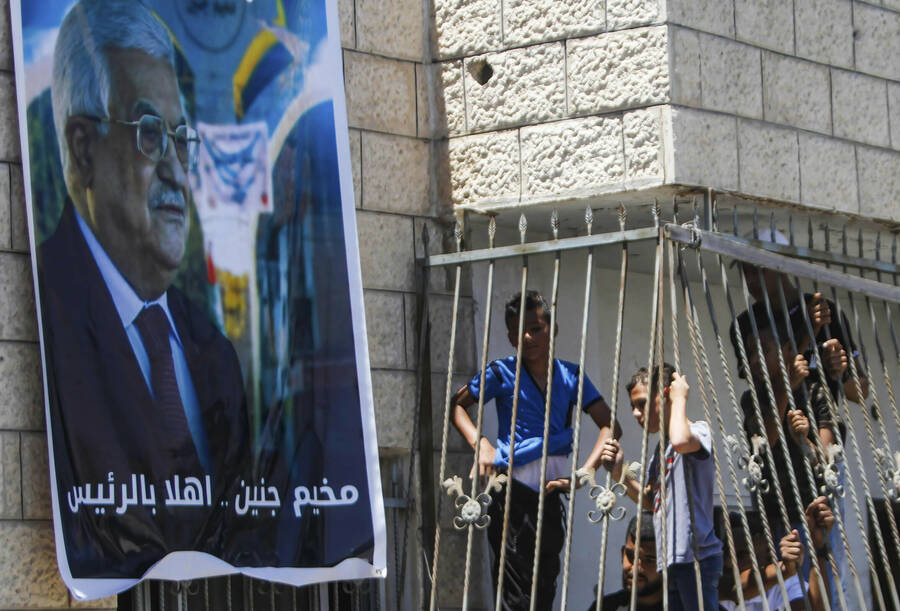The PA’s Slow-Motion Collapse
In the aftermath of Israel’s attack on Jenin, the Palestinian Authority’s efforts to regain legitimacy risk hastening its potentially terminal decline.

A banner picturing Palestinian Authority President Mahmoud Abbas hangs in the alleys of the Jenin refugee camp on July 12th, 2023.
(This article previously appeared in the Jewish Currents email newsletter; subscribe here!)
In early July, a week after Israeli forces invaded the Jenin refugee camp, Palestinian Authority (PA) President Mahmoud Abbas visited the camp for the first time since 2005. Abbas arrived from Ramallah in a Jordanian helicopter, accompanied by a massive, thousand-man armed guard. In his hour-long visit, he delivered a speech at the edge of the camp and laid a wreath at a cemetery where Palestinian militants killed by Israeli forces during the incursion were buried. To venture any further might have risked unwanted confrontations.
Abbas’s trip was an effort to make the PA appear in control over the restive refugee camp and adjacent city, but the visit—which PA forces coordinated with the militant groups that dominate and effectively govern Jenin—illustrated the opposite. Abbas appeared fragile, anemic, and not long for this world, much like the PA itself, which is polling at record lows among Palestinians. In the absence of any resumption of peace talks, Palestinians increasingly see the PA—which has long carried out the dirty work of policing and counterinsurgency to quell opposition to Israel in the West Bank—as a mere tool of the occupation. In recent weeks, crowds have jeered PA officials visiting the camp and even pushed them out of funerals for Palestinian militants killed in Israeli military operations. “Even before the last incursion, the PA was in a state of slow-motion collapse,” explained Khaled Elgindy, the Middle East Institute’s Director of the Program on Palestine and Israeli-Palestinian Affairs.
In an effort to counter the PA’s decline, its security forces are attempting to reassert control over parts of Jenin and Nablus in the aftermath of Israel’s recent incursions. But the process may further compromise the PA’s legitimacy. Not only did the Israeli army operation, which was coordinated with the PA to prevent a clash between Israeli and PA forces, reveal the PA’s inability and unwillingness to defend its own people—now, to show that it is still in control, the PA will need to crack down on the young militants who have taken up the banner of armed resistance to Israel’s occupation, doubly undermining it in the eyes of Palestinians. “It looks like the PA is returning to Jenin on the back of Israeli tanks,” Elgindy said. “That’s not going to do anything to help their already extremely low credibility.”
For some early critics, such as the Palestinian American intellectual Edward Said, the PA’s double-bind was inherent in its creation as part of the Oslo peace process. Said presciently charged that by signing the agreement, Yasser Arafat—leader of the Palestine Liberation Organization, out of which the PA emerged—ended armed resistance and recognized Israel without ending the occupation, which made Oslo a document of “Palestinian capitulation” and the PA the bitter fruit of defeat. Viewed this way, there has been an inverse relationship between the PA’s popular legitimacy and the extent of its conformity to the Oslo framework since its inception.
For many others, the PA’s built-in contradictions came painfully to the fore in the late 2000s, when it redoubled its “state-building” measures. After Israel destroyed the previous Palestinian security infrastructure during the Second Intifada, the PA—under direct US supervision and training—rebuilt and professionalized its Palestine Authority Security Forces (PASF), which swelled into a massive, repressive security apparatus that today employs more than 80,000 people. In her book Polarized and Demobilized: Legacies of Authoritarianism in Palestine, political scientist Dana El Kurd observes that the PA spends a full third of its budget on the PASF. “There is one security/police officer for every forty-eight Palestinians, whereas there is one officer for every 384 Americans,” El Kurd writes. “As another shocking point of comparison, East Germany, considered the quintessential police state, had only one officer or employed informant per sixty-six Germans.”
The restructured PASF soon began cracking down on Islamist and other non-PA militant groups and quashing internal dissent under the rubric of its revamped security coordination with Israeli authorities. According to a recent article by Alaa Tartir, an academic and program director of the Palestinian think tank Al-Shabaka, the PA “sought to tame resistance to Israel’s occupation and colonial domination by criminalizing militancy.” “The PA and its security forces used harassment, marginalization, arrest, detention, and torture against those engaged in resisting Israel,” Tartir writes, pointing to how PA forces conducted “aggressive security campaigns within the occupied West Bank’s most militant spaces” in order to dismantle armed resistance and Palestinian dissident groups. The PA took these steps to demonstrate its capacity for future statehood to Israel and its international donors, and to reassert its aspirational monopoly on the use of violence among Palestinians within the West Bank. The practical effect, however, was to turn the PA into an oppressive regime detested by its own people.
For successive Israeli governments, including those headed by Netanyahu over the last decade and half, this scenario was ideal. While the PASF functioned as a subcontractor enforcing Israel’s occupation, the existence of the PA provided the illusion that a peace process remained viable—even though, in reality, Israel had little intention of ever relinquishing control over the West Bank. The PA became Israel’s preferred tool of occupation management, helping with security coordination while keeping the Palestinian national movement divided.
Israeli leaders have also made the PA into a politically expedient punching bag. Israel has often responded to diplomatic moves by the PA with punitive measures. Last winter, for instance, after the PA requested an advisory opinion on the occupation from the International Court of Justice in the Hague, Israel retaliated by placing a moratorium on Palestinian construction in Area C (the part of the West Bank under full Israeli civil and military rule). Additionally, Israel seized roughly $39 million in Palestinian tax revenue and transferred it to Israeli victims of Palestinian violence, and denied the PA access to its own funds equal to the sum of its payments to Palestinian prisoners and their families. Such economic punishment compounded a PA fiscal crisis that the International Monetary Fund had already, as of 2022, described as “dire.” For months, the PA has teetered on the brink of bankruptcy. The situation illustrates Israel’s strategy towards the PA in the decade-plus of Netanyahu’s rule: keep the PA alive—but just barely.
Netanyahu seemed set on continuing with this occupation-management paradigm when he convened his cabinet last week to approve a plan “to prevent the collapse of the Palestinian Authority.” The plan, which offers no explicit commitment on Israel’s part and appears merely declaratory, is a vague gesture to keep the PA away from the abyss. Yet the Israeli prime minister has faced pushback from his own far-right coalition partners, including Finance Minister Bezalel Smotrich, who leads the Religious Zionism party, and National Security Minister Itamar Ben-Gvir, leader of the extreme right Jewish Power party. Both Smotrich and Ben-Gvir oppose keeping the PA on its feet and hope instead to annex the West Bank in its entirety and expel the Palestinians who resist. “As long as the PA supports terrorism, what interest do I have that it exists,” Smotrich said in January. In response to Netanyahu’s recent bid to prop the PA back up, Ben-Gvir reportedly told the cabinet: “You live in a fantasy world if you believe that the Palestinian Authority hates us less than Hamas . . . You want to strengthen them, [but] in the end, the barrels of their guns will be pointed at us.” Smotrich and Ben-Gvir successfully blocked the cabinet from committing to easing Israeli financial constraints on the PA; Smotrich abstained from voting on the plan, while Ben-Gvir voted against it.
Netanyahu’s coalition partners have also managed to more directly destabilize the PA by pressuring Israel to employ greater and more deadly force against Palestinian militants, as evident in Israel’s brazen incursions into cities like Nablus or the Jenin refugee camp. In the wake of a shooting attack in mid-June for which Hamas claimed responsibility, Ben-Gvir called for a brutal response. “We need a military operation, we need to flatten buildings, we need targeted killings,” he said. “That’s how you act against terrorism.” Little more than a week later, Netanyahu seemed to give him what he had demanded when the IDF launched its latest incursion into the Jenin refugee camp, reducing swaths of the impoverished territory to rubble. Such military escalations further weaken the PA in the eyes of Palestinians. Netanyahu, Elgindy said, “always needs to give the extremist wing of the coalition something, and what they’re given are things that constantly undercut the authority of PA.”
Still, the PA will not collapse overnight. Though it is being challenged by new militant groups from within the West Bank, pressured by Israeli military authorities, and squeezed financially by the Israeli government, there are too many people invested in its survival. “Despite all the effects of the occupation, we have a passport and ID cards that we issue, and educational frameworks, health institutions, hospitals that we manage,” the PA governor of Jenin Akram Rajoub—who lives, in fact, in Ramallah—told +972 Magazine’s Yuval Abraham. “We built the PA with blood, we won’t give up on it.”
Joshua Leifer is a member of the Dissent editorial board. His essays and reporting have also appeared in The Guardian, The Nation, Jacobin, +972 Magazine, and elsewhere.

